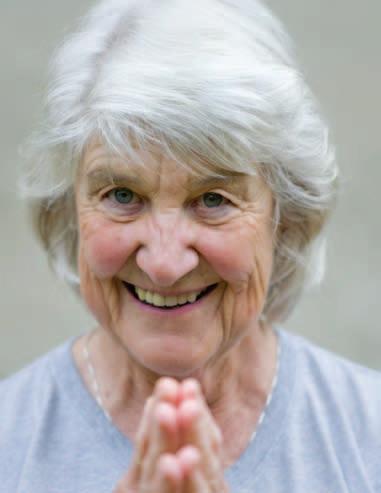
3 minute read
Felicity Green Receives Lighting the Way Award
from Yoga Samachar SS2010
by IYNAUS
For the last 40 years, Felicity Green has been practicing, teaching, and promoting the yoga of B.K.S. Iyengar. This year, at age 77, she receives the Lighting the Way award for distinguished volunteer service to the Iyengar Yoga community.
Felicity first met Mr. Iyengar when he came to San Francisco in 1974, although she had been studying his method since the early 1970s. From 1976 until 2000, she traveled often to Pune to study, until long distance flights became detrimental to her health. In recalling her first visit with 14 others from the United States and Canada, one of her most vivid memories is the first class. Mr. Iyengar began it with Sirsasana and asked them to drop back into Viparita Dandasana—repeatedly. No one in the group had ever done this before, but it immediately diminished any fears. Felicity was a founding member of the Iyengar Institute in San Francisco and a member of their faculty from 1976 to 1983. From there, she spent three years living in Canada at the ashram Steven Horn, stevehorn.net of Swami Radha, which had a profound effect on her understanding of philosophy. When she returned to the United States, she settled in Seattle and created the Community Yoga Circle. In the early 1990s, she organized and helped lead the first Northwest Regional association. She later helped revitalize interest and started the current IYANW in 2003.
Advertisement
Initially, Mr. Iyengar selected a small group of teachers to certify other teachers. This group, of which Felicity was a member, was instrumental in creating the current assessment process. In the beginning, there were teachers on each coast separately deciding who they believed deserved certification. Felicity remembers that the need for consistency between the two groups is one of the major reasons that the national organization and a more standardized assessment process came into being. In the minutes of an early IYNAUS board meeting, Felicity is given credit for the idea of standardizing the process. She was a member of the first elected IYNAUS Board and served as an assessor until 2005.
Her teaching in the United States, Canada, New Zealand, Australia, Switzerland, and her native South Africa has inspired thousands and has promoted Iyengar Yoga throughout the world. Trained as an occupational therapist, Felicity was attracted to the healing powers of yoga, on both the physical and psychological level. Because her husband studied with Ida Rolf, she was familiar with that system of structural integration that values the integrity of the body. She believed that Iyengar Yoga aligned perfectly with that knowledge. She says that Guruji’s teaching and method appealed to both her rational mind and her spirit. She recognized early on Mr. Iyengar’s concept of the integration of Asana and philosophy and brought it into her own teaching.
In 1997, Felicity moved to Lopez Island, off the coast near Seattle. The island is 15 miles long and 8 miles wide, with 2200 year-round residents. Every one of them thinks they live in paradise and are sure that Felicity Green was sent there to make it better. Of all the things she has accomplished in promoting the benefits of yoga, perhaps her most treasured is the Creaky Yoga class that she created for her island residents. Inspired by
the aging population of the island, she devised a class to keep her students strong and mobile enough to stay in their homes and live independently and safely for as long as possible. In addition, she continues to teach one-on-one and works with teachers preparing for certification.
Patanjali’s Yoga Sutras tell us that long, uninterrupted practice is the foundation of yoga. Felicity Green’s contribution to the Iyengar Yoga community has been just that. The IYNAUS Board is honored to present her with the third annual Lighting the Way award.
She joins previous recipients Joan White and Mary Dunn. Our organization has grown from a core of pioneers who began in the 1970s to promote the teachings of B.K.S. Iyengar. It is important to honor our past as we look to our future. It is hoped that this award will bring to the rest of the community the potential and need for volunteer contributions.
—Pat Musburger










